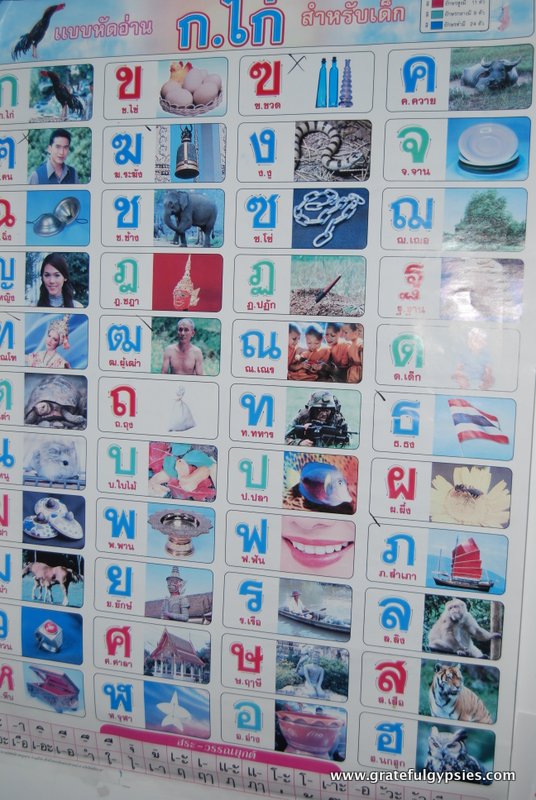How Much Thai Can You Learn in a Week? Posted by sasha on Oct 29, 2014 in Beginner, Travel
This month I had to get out of China for a visa run, something that anyone who has lived abroad probably understands quite well. With not a whole lot of time or money on my hands, I had to give this some serious thought. There’s always the typical Shenzhen-Hong Kong border crossing, but I had already been there twice just this summer. From my new home in Kunming, it’s a bus ride to both Vietnam and Laos, but both of those countries also require visas. Thanks to the cheap flight that I found, Bangkok won out in the end. Since I just spent two months in Thailand earlier this year traveling all over the place, I decided to do something different this time – learn some Thai. After having traveled so extensively there, I was a bit embarrassed at my complete and utter lack of the language. Plus, since I’m back on the Thai language & culture blog, I figured it wouldn’t be a bad idea to learn some Thai myself. Rather than be a backpacker or tourist, this time around I wanted to be a student.
Thanks to my available dates and a Thai national holiday (Chulalongkorn), there would only be six days where I could take class at the center where I had made plans. It was time for a mission – how much Thai can you learn in one week? The answer, simply put, is not very much. I did, however, find my 20 hours of class very rewarding, and I was able to speak at a very beginner level by the end. It was great to get back into a classroom on the other side (I work as an ESL teacher in China), my teachers were very patient and helpful, and I feel like I learned a lot more about Thailand and the culture in addition to picking up some language basics.
Based on my experiences in the classroom, here are some of my impressions and tips on learning Thai for absolute beginners:
Try to Learn Thai Script from Day One
Thanks to my very short course, my teachers didn’t bother trying to teach me Thai script. Instead, we used phonetics to focus primarily on pronunciation and other speaking skills rather than reading or writing. Now that I’m back in China and I’m trying to continue with my Thai studies and put together some beginner videos for the blog, I can see how much more beneficial it would be to know the written form. It may look intimidating, but learning Thai is nothing like learning Chinese – there aren’t even close to as many symbols to remember. Unlike in Chinese, learning Thai script will help you with your pronunciation. We’ll have some videos up shortly teaching the Thai consonants and vowels, so study them and your Thai will improve much more quickly.
The Tones Aren’t That Hard
Sure, Thai is a tonal language with five different tones. People always freak out about a language having tones, but if you think about it, we use tones all the time in English! Just think about how your voice rises at the end of a question, like poor Ron Burgundy when someone slipped a question mark into the teleprompter…
Seriously, though – the tones in Thai and any other language can be tackled with lots of listening and repetition. This is where having a native speaking teacher or friend really comes in handy, as you can just go over and over them until you’re comfortable. I was already familiar with tones after learning Chinese for a few years, but the falling tone in Thai gave me a bit of trouble as there isn’t a tone like it in Mandarin. The tones are important and all, but you’ll be able to get your meaning across most of the time even if your tones aren’t perfect.
The Grammar is Pretty Easy
At least at an absolute beginner level, there were no big hurdles for me to jump when it comes to Thai grammar. The structure “Subject + Verb + Object” is also followed (for the most part) in Thai. Verbs do not need to be conjugated, tense can be understood from context, there’s no need for articles before nouns. That being said, there are a few aspects of beginner Thai grammar that can be a bit tricky. For one, you have the countless noun classifiers, which are a pain in the butt to learn. You also put a noun before an adjective, so you have to get used to saying things like “shirt green.”
Don’t Forget “Ka” or “Krap”
If you’ve ever been to Thailand, you should already be familiar with these two words – ka and krap. These are particles used at the end of a statement or question to make it more polite. Krap is used by men, and ka is used by women. Add the word to the end of just about everything if you’re a newb traveling in Thailand – it’s better to be overly polite than even slightly impolite. If you think you’re overusing it, just listen to Thai people – you hear these words all the time!
People Love it When You Speak Thai
Thailand is one of the most popular countries in the world to visit, and millions upon millions of tourists from all over the place come here every year. Of course, very few of them speak even a single word of Thai (myself included before this most recent trip). If you try to speak Thai with locals – even if it’s just a tiny bit – they’ll appreciate it. I had a few very slow and funny conversations with cab drivers on this trip thanks to my less than mediocre Thai skills, and they seemed to be quite entertained and happy to see a farang trying to speak their language. Thai people are some of the friendliest you’ll ever encounter, and they’ll definitely open up more to someone who speaks Thai.
The End Result of 20 Hours
In the end, I took 20 hours of one-on-one Thai classes in Bangkok. Considering about 4-5 hours of that time was spent with the teachers doing voice-overs for our new “Beginner Thai” video series, that means I had around 15 actual hours of class time. In that time, this is what I managed to achieve:
- pronunciation based on a phonetic system
- the five tones
- counting up to one million
- simple sentence structures
- self-introductions
- time, days, weeks, months, years
- family members
- countries/nationalities/languages
- using question words
- food and drink vocabulary and basics
For such a short time, and being the notorious slacker that I am, I’d say that’s not half bad. My Thai still sucks, I’m sure, but it’s better than being non-existent! I hope this post encourages some people to make a similar decision and begin to study Thai. Even though I don’t live there or even plan to move there anytime soon, I think it was a great use of my time to learn a bit of the language. After all, Thailand is an amazing place to travel, and it’s even better if you know some Thai! Luckily we’ve got you covered here if and when you decide to learn Thai.
If you want to learn Thai in Bangkok, check out Everyday Thai Language School. It’s in a central location and the teachers are great!

Build vocabulary, practice pronunciation, and more with Transparent Language Online. Available anytime, anywhere, on any device.
About the Author: sasha
Sasha is an English teacher, writer, photographer, and videographer from the great state of Michigan. Upon graduating from Michigan State University, he moved to China and spent 5+ years living, working, studying, and traveling there. He also studied Indonesian Language & Culture in Bali for a year. He and his wife run the travel blog Grateful Gypsies, and they're currently trying the digital nomad lifestyle across Latin America.






Comments:
Michel:
Great! I see you met with Kruu Goy and Chin At Everyday Thai! I loved that place!